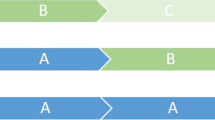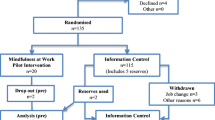Abstract
Disseminating mindfulness-based cognitive therapy (MBCT), an evidence-based group treatment, in the workplace may help employees who have recovered from depression to prevent depressive relapse and stay well. Employees’ potential confidentiality concerns about participating in a group-based workplace MBCT intervention may be alleviated by delivering MBCT in alternative formats that would maintain the employees’ anonymity. The aim of the current study was to determine the stated preferences of employees from large healthcare organizations for four different MBCT delivery methods (i.e., group, online group, individual, and individual via the telephone). We determined the stated preferences of 151 health authority employees for the four MBCT delivery methods using a discrete choice experiment comprised of 18 choice sets of five attributes. A latent class model was used to evaluate the heterogeneity of respondents' preferences. This analysis suggested that four classes existed in the sample. The most important preferences were the effectiveness of MBCT, the type of interaction, face-to-face delivery, and receipt of MBCT on their own time. These results suggest strong preferences for the four different MBCT delivery methods. The presence of latent classes also shows that preferences for alternative modes of delivery vary in association with differences in sociodemographic variables between groups of employees. The overall findings of this study have the potential to influence the development of institutional programs that could make workplace MBCT more appealing to a greater number of employees, thereby improving participant uptake, decreasing the potential for depressive relapse, and minimizing absenteeism.


Similar content being viewed by others
References
American Psychological Association. (2010). Ethical principles of psychologists and code of conduct. Washington, DC. http://www.apa.org/ethics/code/index.aspx. Accessed: 19 June 2011.
Attridge, M. (2008). A quiet crisis: the business case for managing employee mental health—human solutions report. Wilson Banwell PROACT Human Solutions.
Australian Psychological Society. (2011). Code of ethics. Melbourne: Australian Psychological Society.
Berti Ceroni, G., Neri, C., & Pezzoli, A. (1984). Chronicity in major depression. A naturalistic perspective. Journal of Affective Disorders, 7(2), 123–132.
Chang, S. M., Hong, J. P., & Cho, M. J. (2011). Economic burden of depression in South Korea. Social Psychiatry and Psychiatric Epidemiology. doi:10.1007/s00127-011-0382-8.
Coelho, H. F., Canter, P. H., & Ernst, E. (2007). Mindfulness-based cognitive therapy: evaluating current evidence and informing future research. Journal of Consulting and Clinical Psychology, 75, 1000–1005.
Cooper, C., Bebbington, P., King, M., Brugha, T., Meltzer, H., Bhugra, D., et al. (2007). Why people do not take their psychotropic drugs as prescribed: results of the 2000 National Psychiatric Morbidity Survey. Acta Psychiatrica Scandinavica, 116, 47–53.
Dewa, C. C., Lesage, A., Goering, P., & Caveen, M. (2004). Nature and prevalence of mental illness in the workplace. Healthcare Papers, 5, 12–25.
Farrar, S., Ryan, M., Ross, D., & Ludbrook, A. (2000). Using discrete choice modelling in priority setting: an application to clinical service developments. Social Science & Medicine, 50(1), 63–75.
Greenberg, P. E., Kessler, R. C., Birnbaum, H. G., Leong, S. A., Lowe, S. W., Berglund, P. A., et al. (2003). The economic burden of depression in the United States: how did it change between 1990 and 2000? The Journal of Clinical Psychiatry, 64, 1465–1475.
Guimaraes, C., Marra, C. A., Colley, L., Gill, S., Simpson, S. H., Meneilly, G. S., et al. (2009). A valuation of patients' willingness-to-pay for insulin delivery in diabetes. International Journal of Technology Assessment in Health Care, 25(3), 359–66.
Guimaraes, C., Marra, C. A., Gill, S., Simpson, S., Meneilly, G., Queiroz, R. H., et al. (2011). A discrete choice experiment evaluation of patients' preferences for different risk, benefit, and delivery attributes of insulin therapy for diabetes management. Patient Preference and Adherence, 4, 433–40.
Healthcare Benefit Trust. (2007). Provincial Health Services Authority report on employee workplace health survey. Vancouver: Author.
Hole, A. R. (2008). Modelling heterogeneity in patients' preferences for the attributes of a general practitioner appointment. Journal of Health Economics, 27(4), 1078–94.
Ipsos Reid. (2007). Mental health in the workplace: Largest study ever conducted of Canadian workplace mental health and depression. http://www.ipsos-na.com/news-polls/pressrelease.aspx?id=3724. Accessed: 13 June 2011.
Judd, L. J. (1997). The clinical course of unipolar major depressive disorders. Archives of General Psychiatry, 54, 989–991.
Keller, M. B., Lavori, P. W., Lewis, C. E., & Klerman, G. L. (1983). Predictors of relapse in major depressive disorder. Journal of the American Medical Association, 250(24), 3299–3304.
Kessler, R. C., Kessler, R. C., Akiskal, H. S., Ames, M., et al. (2006). Prevalence and effects of mood disorders on work performance in a nationally representative sample of U.S. workers. American Journal of Psychiatry, 163, 1561–1568.
Kuyken, W., Byford, S., Taylor, R. S., Watkins, E., Holden, E., White, K., et al. (2008). Mindfulness-based cognitive therapy to prevent relapse in recurrent depression. Journal of Consulting and Clinical Psychology, 76(6), 966–978.
Kwan, B. M., Dimidjian, S., & Rizvi, S. L. (2010). Treatment preference, engagement, and clinical improvement in pharmacotherapy versus psychotherapy for depression. Behavioral Research Therapy, 48, 799–804. doi:10.1016/j.brat.2010.04.003.
Lancsar, E., & Louvier, J. (2006). Deleting irrational responses from discrete choice experiments: a case of investigating or imposing preferences? Journal of Health Economics, 18, 797–812.
Lang, A. J. (2005). Mental health treatment preferences of primary care patients. Journal of Behavioral Medicine, 28, 581–586. doi:10.1007/s10865-005-9019-2.
Lau, M. A., Grabovac, A., & Willett, B. (2010). Mindfulness-based cognitive therapy for the prevention of depressive relapse in the workplace. Paper presented as part of a symposium entitled “Mental Health in the Workplace: An Initiative of the Great West Life Innovation Fund of the FCPA” at the 60th Canadian Psychiatric Association Annual Conference, Toronto, Canada.
Ma, S. H., & Teasdale, J. D. (2004). Mindfulness-based cognitive therapy for depression: replication and exploration of differential relapse prevention effects. Journal of Consulting and Clinical Psychology, 72, 31–40.
Marcotte, E. M., Pellegrini, M., & Thompson, M. J. (1999). A combined algorithm for genome-wide prediction of protein function. Nature, 402, 83–86.
Mark, T. L., & Swait, J. (2004). Using stated preference and revealed preference modeling to evaluate prescribing decisions. Health Economics, 13(6), 563–73.
McFadden, D., & Train, L. (2000). Mixed MNL models for discrete response. Journal of Applied Econometrics, 15, 447–70.
McTaggart-Cowan, H. M., Shi, P., Fitzgerald, J. M., Anis, A. H., Kopec, J., Bai, T., et al. (2008). An evaluation of patients' willingness to trade off symptom-free days for asthma-related treatment risks: a discrete choice experiment. The Journal of Asthma, 45, 630–38.
Murphy, J. M., Laird, N. M., Monson, R. R., Sobol, A. M., & Leighton, A. H. (2000). Incidence of depression in the Stiling County Study: historical and comparative perspectives. Psychological Medicine, 30(3), 505–514.
National Health Services. (2011). About NHS: NHS core principles. http://www.nhs.uk/NHSEngland/thenhs/about/Pages/nhscoreprinciples.aspx. Accessed: 21 June 2011.
National Institute for Clinical Excellence (NICE). (2009). Management of depression in primary and secondary care. London: National Institute for Clinical Excellence.
Newman, S. C., & Bland, R. C. (1998). Incidence of mental disorders in Edmonton: estimates of rates and methodological issues. Journal of Psychiatric Research, 32(5), 273–282.
Offord, D. R., Boyle, M. H., Campbell, D., Goering, P., Lin, E., Wong, M., et al. (1996). One year prevalence of psychiatric disorder in Ontarians 15 to 64 years of age. Canadian Journal of Psychiatry, 41, 559–563.
Oteng, B., Marra, F., Lynd, L. D., Ogilvie, G., Patrick, D., & Marra, C. A. (2010). Evaluating societal preferences for human papillomavirus vaccine and cervical smear test screening programme. Sexually Transmitted Infections, 87(1), 52–7.
Patten, S. B., Wang, J. L., Williams, J. V. A., Currie, S., Beck, C. A., Maxwell, C. J., et al. (2006). Descriptive epidemiology of major depression in Canada. Canadian Journal of Psychiatry, 51(5), 84–90.
Ryan, M., & Gerard, K. (2003). Using discrete choice experiments to value health care programmes: current practice and future research reflections. Applied Health Economics and Health Policy, 2(1), 55–64.
Segal, Z. V., Williams, J. M. G., & Teasdale, J. D. (2002). Mindfulness-based cognitive therapy for depression: a new approach for preventing relapse. New York: Guilford Press.
Segal, Z. V., Bieling, P., Young, T., MacQueen, G., Cooke, R., Lawrence, M., et al. (2010). Antidepressant monotherapy vs sequential pharmacotherapy and mindfulness-based cognitive therapy, or placebo, for relapse prophylaxis in recurrent depression. Archives of General Psychiatry, 67(12), 1256–1264.
Sobocki, P., Jonsson, B., Angst, J., & Rehnberg, C. (2006). Cost of depression in Europe. The Journal of Mental Health Policy and Economics, 9, 87–98.
Swift, J. K., & Callahan, J. L. (2009). The impact of client treatment preferences on outcome: a meta-analysis. Journal of Clinical Psychology, 65, 368–381. doi:10.1002/jclp.20553.
Swift, J. K., Callahan, J. L., & Vollmer, B. M. (2011). Preferences. Journal of Clinical Psychology, 67, 155–165. doi:10.1002/jclp.20759.
Teasdale, J. D., Segal, Z. V., Williams, J. M. G., Ridgeway, V. A., Soulsby, J. M., & Lau, M. A. (2000). Prevention of relapse/recurrence in major depression by mindfulness-based cognitive therapy. Journal of Consulting and Clinical Psychology, 68, 615–623.
Telser, H., & Zweifel, P. (2002). Measuring willingness-to-pay for risk reduction: an application of conjoint analysis. Health Economics, 11, 129–139.
Wang, P. S., Beck, A. L., Berglund, P., McKenas, D. K., Pronk, N. P., Simon, G. E., et al. (2004). Effects of major depression on moment-in-time work performance. The American Journal of Psychiatry, 161, 1885–1891.
Author information
Authors and Affiliations
Corresponding author
Rights and permissions
About this article
Cite this article
Lau, M.A., Colley, L., Willett, B.R. et al. Employee’s Preferences for Access to Mindfulness-Based Cognitive Therapy to Reduce the Risk of Depressive Relapse—A Discrete Choice Experiment. Mindfulness 3, 318–326 (2012). https://doi.org/10.1007/s12671-012-0108-3
Published:
Issue Date:
DOI: https://doi.org/10.1007/s12671-012-0108-3




